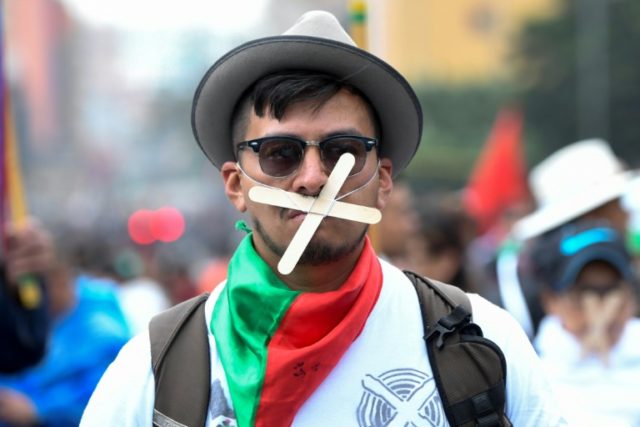Bogota (AFP) – Hundreds of thousands of Colombians took to the streets of the capital Bogota on Thursday amid a general strike to protest the policies of President Ivan Duque’s right-wing government.
There were reports of clashes and arrests as trade unions, students, opposition parties and the South American country’s indigenous organizations challenged the full gamut of Duque’s economic, social and security policies.
At night, a thunderous chorus of pot-banging, unusual in Colombia, took place in the cities of Cali and Medellin, and lasted for hours in Bogota.
“Colombia won on this historic day of citizen mobilization,” a statement by organizers from the National Strike Committee said, as they requested an “immediate” meeting with Duque to discuss the protesters’ array of complaints.
“We call on all citizens to be ready to take further action in the street if the national government continues to neglect our demands,” they added.
Later in the day Duque announced that he had heard the protesters’ demands, but did not respond to their request for direct dialogue.
“Today, Colombians spoke. We hear them. Social dialogue has been a main principle of this government and we need to deepen it with all sectors of society,” he said.
The protests come amid social upheaval across South America, as a wave of unrest over the past two months has battered governments in Chile, Bolivia and Ecuador.
The popularity of Duque’s right-wing government — a key US ally — has been on the wane since his election 18 months ago, as it deals with hosting 1.4 million refugees from neighboring Venezuela’s economic meltdown as well as the complex fallout of a 2016 peace deal with FARC rebels and rampant drug trafficking.
– Troops deployed –
Troops were deployed in the capital and other cities to protect “strategic facilities,” authorities said.
The Colombian office of the UN High Commissioner for Human Rights voiced concern over the deployment, saying states must limit the use of military forces “for the control of internal disturbances.”
Spokesmen for several organizations backing the protests said more than one million people had marched nationwide.
Interior Minister Nancy Patricia Gutierrez counted some 207,000 demonstrators, adding that “in general terms the participants marched peacefully” while denouncing “some vandals who wanted to disrupt public order.”
At least 42 civilians and 37 police were wounded in clashes, and 36 people were arrested across the country, according to authorities.
In the center of Bogota, clashes took place at nightfall, where people wearing ski masks and hoods threw stones and other projectiles at police, who fought back with tear gas.
A new gathering of people banging pots was called for Friday afternoon, as young protesters continued to demonstrate into the night shouting “Long live the national strike.”
The general strike was widely followed in big cities like Bucaramanga in the northeast and Medellin in the northwest, along with Bogota where riot police used stun grenades to turn back thousands of students walking towards the international airport, an AFP journalist said.
Several separate marches converged on Bolivar Square, the historic center of the capital close to the presidency.
“We are marching because in Colombia we are tired of corruption, of impunity, that the government does nothing for the poor,” Olga Canon, 55, told AFP.
Organizations that participated in the strike take issue with Duque’s security policy as well as attempts to introduce a more flexible labor market, weaken public pension funds and raise the retirement age.
Students are demanding more funding for education, while indigenous communities insist on greater protection in remote areas where 134 activists have been killed since Duque came to power in August 2018.
– ‘Afraid to march’ –
“We are very afraid to march in the streets but we do it anyway because the state is spreading so much fear with its militarization and by closing the borders,” political science student Valentina Gaitan, 21, told AFP.
The borders with Brazil, Ecuador, Peru and Venezuela were closed until Friday to avoid any threat to “public order and security,” authorities said.
Duque, who does not hold a majority in parliament, suffers from a 69 percent unpopularity rating, according to polls. His party, the Democratic Center (CD), suffered serious setbacks in October local elections.
Political analyst Jason Marczak said the outrage against the government, the target of several demonstrations in recent months, is part of a “considerable demonstration of discontent in the region.”
“The unsatisfied claims and deep polarization are the basis for this massive event,” said Marczak, of the Washington-based Atlantic Council.

COMMENTS
Please let us know if you're having issues with commenting.